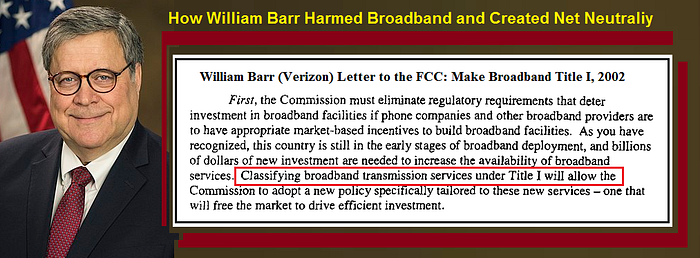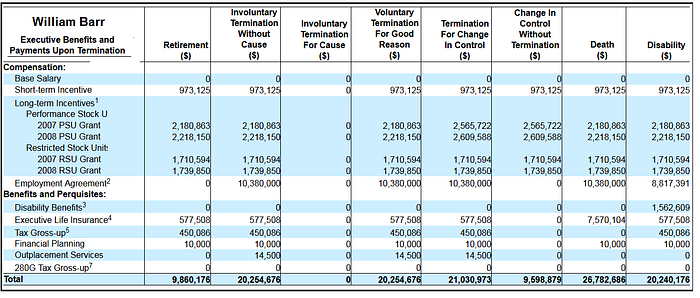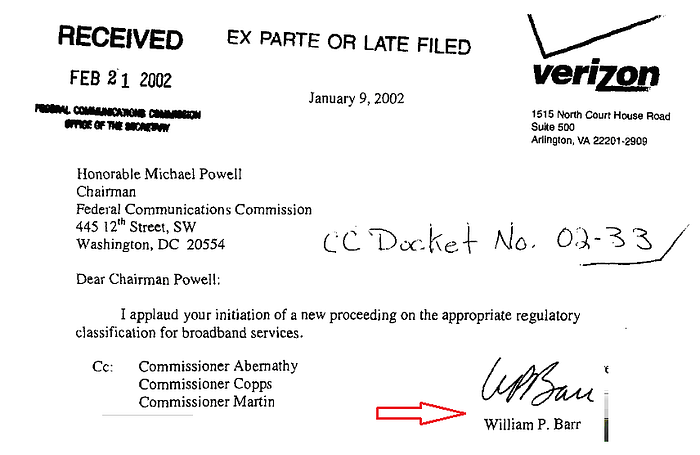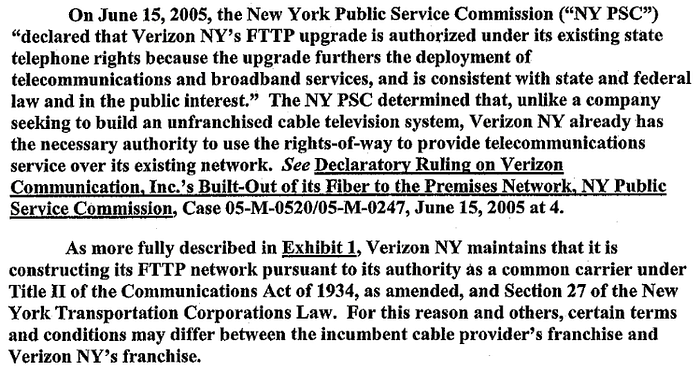How William P. Barr and Verizon Harmed Broadband & Created Net Neutrality.

I have been wondering why Congress never examined the details of what William P. Barr worked on and was responsible for, first at GTE, and then at Verizon, (which was created through the merger of GTE and Bell Atlantic). Unfortunately, larger proved not to be better as there were a series of customer unfriendly, well, downright harmful actions committed under the legal guidance of William P. Barr.
Barr is the current US Attorney General and previously held the position from 1991–1993. Then, it appears he was offered a deal he probably couldn’t refuse; to work first for GTE in 1994 as executive vice president and general counsel, then at Verizon, leaving in 2008 with a golden parachute worth at least $20 million — to start.
See William P. Barr’s bio on Wikipedia
Harmful Acts Directed by Barr.
In the excerpt above, William Barr, while at Verizon, wrote and filed with the FCC claiming that broadband should be classified as “Title I”, an “Information” service, with no obligations, i.e.; it would be private property. Yet, at the same time, Verizon went state-to-state to claim that the fiber optic wires used for FiOS should be “Title II” and be part of the state utility. “Title II” has “common carrier” obligations to not block, degrade or control the content or services going over the wires, especially those offered by competitors.
But, unknown to most, Verizon claimed that the fiber-to-the-home wires were just an upgrade of the existing state utility, and using Title II, Verizon was able to use the state utility construction budgets which, in turn, were then charged to local phone customers. Moreover, these same public utility construction budgets were also diverted to build out Verizon’s Wireless business.
Back-tracking the history, in the 1990’s there was a plan called the “Information Superhighway” and it was America’s first wave of promising a fiber optic future that never showed. GTE, as well as Bell Atlantic, had commitments in most of their territories to upgrade the aging copper wires of the state public utility to fiber optics. These networks were never built out as advertised but that did stop Verizon from charging customers for the networks they never got.
On top of all this, in 2000, when Verizon was formed, there were a host of merger commitments to compete out-of-region for wireline broadband services, which also did not materialize.
Compounding this, as soon the ink was dry on the merger deal, Barr got the FCC to follow the path that started the Net Neutrality wars. By classifying broadband and Internet as “Title I”, Verizon was able to shut down the rights of independent ISPs and most competitors to use the networks, directly harming competition in America.
For the full story, FREE DOWNLOAD: “The Book of Broken Promises: $400 Billion Broadband Scandal & Free the Net”
What follows is a cursory look at just a few items of interest.
Barr Cleaned Up, Financially.
In 2008, Barr’s Verizon salary and bonuses totaled $16 million. And I particularly like the reimbursement for “taxes associated with personal travel and life insurance”.

Part of the 2008 payments included a cash separation payment equal to $10.38 million.
“Barr retired from the Company effective December 31, 2008. The Company has determined that Mr. Barr is eligible to receive separation benefits under the terms of his employment agreement… The total amount of his cash separation payment is equal to $10,380,000 and will be payable on or about July 1, 2009. In addition, Mr. Barr is eligible to receive certain other benefits that he is entitled to as a retiree of the Company.”
But there’s more. This was part of the $20+ million dollar total from the executive benefits and stock options listed in the Verizon 2008 Proxy shareholder documents titled “upon termination”. (I didn’t bother to calculate the value of the stocks or what was sold off since the retirement.)

Dead, disabled or alive, the guy had to make over $20 million when he left Verizon.
We would like to know: In our recent examination of the Corporate Operations expenses, though it is impossible to figure out all of the details without audits, it may be that Barr’s salary and some of these perks were actually being paid for by local phone customers as ‘executive pay’.
Barr: Broadband Should Be “Title I”. Welcome to the Dawn of Net Neutrality.
But, it isn’t the millions in salary Barr received that is bothersome; it was the hundred of billions in harms that occurred, with Barr being one of the lawyers that led the charge to create Net Neutrality problems.

Barr’s letter to then-FCC Chairman Michael Powell in 2002 details that the FCC should get rid of Title II for broadband and make it Title I. As the excerpt of the letter in the opening claims, classifying broadband transmission service as “Title I” would ‘free the market’, and would provide billions of dollars in new investments, and…
But it is this excerpted paragraph below which includes “regardless of the heritage of the company that provides them”, that is really the key. To paraphrase: Regardless of previous commitments in the state utilities for broadband that customers paid for… let’s just make believe that there is no history, no heritage.

My personal favorite is this make-believe thought — that Title I will avoid significant disincentives to build broadband.

And most importantly — broadband doesn’t have to be a common carrier service…

On the Contrary:
Verizon Went State-to-State to Get Broadband Classified as “Title II”.
Just to make sure we’re on the same page, as previously mentioned, even though Verizon et al. keep telling everyone Title II harms investment in the Net Neutrality fights, the truth is Title II has been and still is the investment mechanism.
Verizon went to every state where it is the utility to get state laws changed so that FiOS, the broadband fiber to the home service, would be classified as Title II and be a common carrier network. This allowed Verizon to add the expenses for these networks to the state public utility construction budgets and get the various perks, like the rights-of-way — for free.
This next excerpt is about Verizon NY and it was part of a FiOS franchise. It details that the NY Public Service Commission “declared” that Verizon’s “FTTP”, fiber-to-the-premises service, is Title II and common carriage.

William Barr had to know about Verizon’s state-based claims; that it wanted Title II for FiOS, as this happened in every state — and this happened in 2005, while Barr was still general counsel at Verizon.
These verbal slight-of-hand maneuvers:
- To conceal from the FCC and public the fact that the company had been going state-to-state to have the fiber networks be built as Title II,
- To claim that Title II harms investment, (which Verizon et al. have been claiming for the last decade),
- To hide the fact that the construction investments were coming out of the state utility construction budgets,
- To hide that Verizon customers were defacto investors in these broadband networks,
- To hide that Verizon was able to get rate increases in New York for the build out of these fiber networks,
- To hide that the construction budgets were also being used to have the local phone customers end up paying for the construction of the wireless networks…
…violated the law. We believe and filed a complaint — that the FCC should have examined and considered this to be a case of perjury as the company signed documents claiming that the statements they filed about harms to investments by Title II pertaining to Net Neutrality were truthful.
Starting in 2005, the NY Public Service Commission granted multiple rate increases for FiOS. The NY Public Service Commission press release explains that the 2009 rate increase was for “massive deployment of fiber optics”.
“‘We are always concerned about the impacts on ratepayers of any rate increase, especially in times of economic stress,’ said Commission Chairman Garry Brown. ‘Nevertheless, there are certain increases in Verizon’s costs that have to be recognized. This is especially important given the magnitude of the company’s capital investment program, including its massive deployment of fiber optics in New York. We encourage Verizon to make appropriate investments in New York, and these minor rate increases will allow those investments to continue’.” (Emphasis added)
Why is this story important, besides the truth and trust issues with our current US Attorney General, William Barr?
All of these actions occurred on William Barr’s watch, when he was lead attorney for Verizon, and they have come back to haunt us. Worse, this current FCC has ignored every state-based broadband commitment, all of the construction cross-subsidies, how the monies that were supposed to go to the state utility build out went to wireless, or that local phone customers became defacto investors because the Verizon networks are classified as Title II when they are being built.
And we certainly can’t ask the Department of Justice under Barr or the FCC to investigate these issues, now can we?
This is just one rock we turned over; there’s plenty more still in the public domain just waiting to be exposed.
